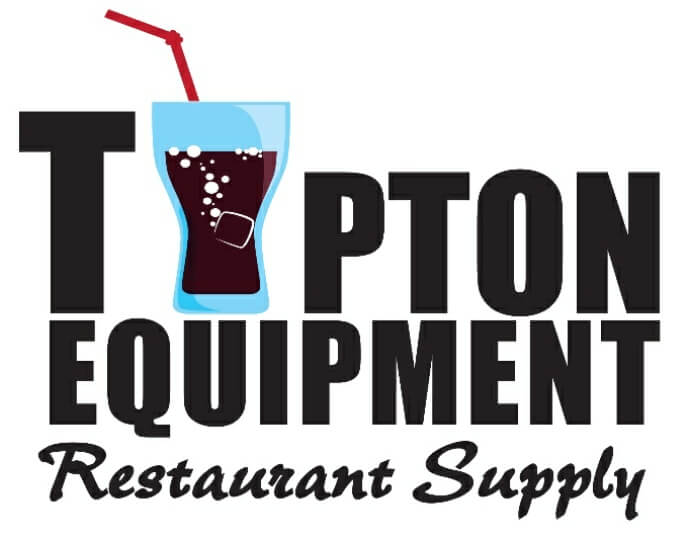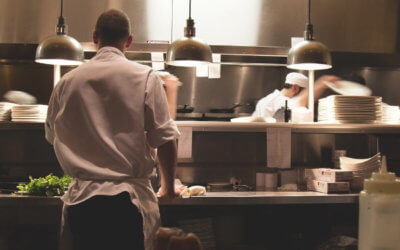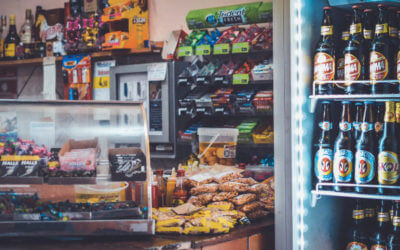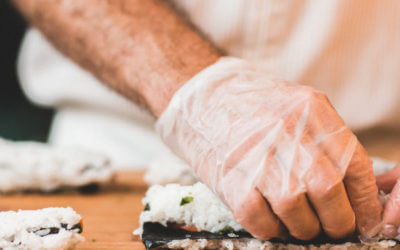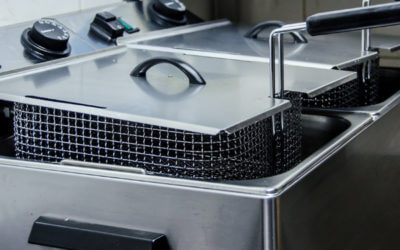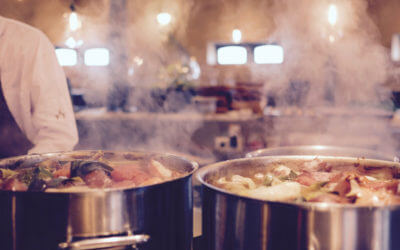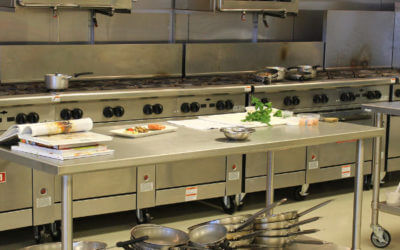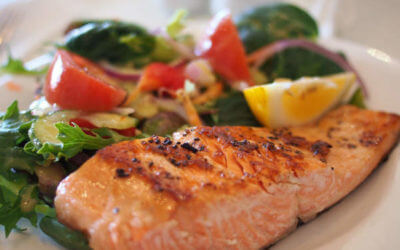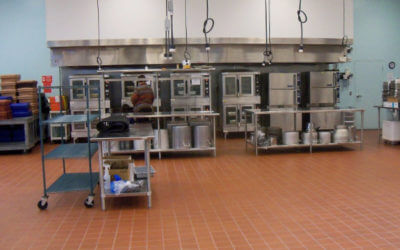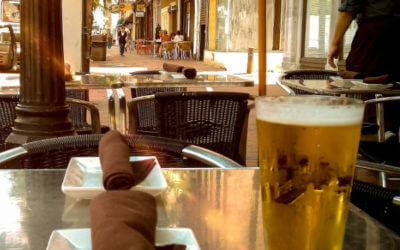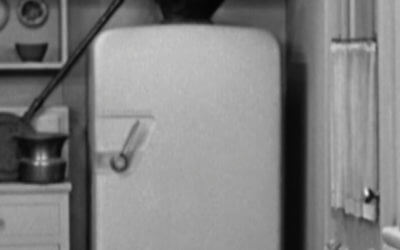Getting Your Commercial Kitchen Up and Running
August 29, 2019Getting your commercial kitchen up and running.
Serving Ware
If there’s nothing to serve the food on, there’s no restaurant. You’ll need tons of cutlery, plate ware, bowls, ramekins, cups, and glasses. Consider the number of tables you can fit in your restaurant and how many guests you hope to serve every night when factoring in how much to buy. Consider breakage – in the chaotic environment of commercial kitchens; it’s not uncommon to lose a plate or glass every few shifts.
Cooking Equipment for Your Commercial Kitchen
Consider what tools you’d need to execute your entire menu in one shift. Pots of all sizes, sauté pans, tasting spoons, mixing spoons, sheet pans, whisks, fish spatulas, ladles, bowls of all sizes, squeeze bottles, bench scrapers – the list goes on and varies widely depending on the type of food you want to make. You’ll also need more of each item than you expect.
Safety Equipment and Your Commercial Kitchen
Make sure your kitchen has proper safety equipment. A well-stocked first aid or medical emergency kit is crucial in a commercial kitchen that runs on fire and knives. Check your local fire department guidelines before purchasing fire, safety, or sanitation equipment, and avoid potential complications by always keeping your kitchen up to fire code standards.
Commercial Kitchen Freezers and Refrigerators
All commercial kitchens require a refrigeration system of some type. Without a fridge, you can’t keep the ingredients and prepared foods fresh. Freezers are also crucial for inventory management because it’s much more cost-effective to buy 300 steaks and freeze them than to buy ten steaks every day.
Industrial-grade refrigeration units are designed to meet the unique needs of the food industry. For example, they can cool large pots of sauce to a safe temperature in record time, so they’re a crucial purchase for any food handling operation. You’ll have to decide between reach-in units and walk-in units.
Make sure to seek professional help for installation and that you know how to properly maintain your unit, as they can be costly to repair.
Food Preparation Counters and Cutting Boards
Prep tables, counters, and cutting surfaces are essential to any commercial kitchen and come in various sizes. Choose preparation surfaces made of stainless steel, sturdy against corrosion, doesn’t absorb bacteria from food or meat and can withstand the harsh cleaning products used in commercial kitchens. On the line, you’ll want food prep counters that have small refrigerators underneath them for easy access to food prepped for each station.
As for cutting surfaces, choose either plastic or wooden cutting boards. Plastic boards are more comfortable to sanitize but can develop deep grooves that can hide bacteria. Wooden boards are generally tougher to clean than plastic ones but don’t develop grooves as quickly.
Ranges and Ventilation
If your restaurant plans on making anything but salad, you’ll need a kitchen range. The range is the powerhouse of the kitchen, so it’s essential to choose one that meets both your cooking needs. Like residential ranges, commercial units can be either gas or electric. If you’d prefer a visual, responsive cooking experience, go for a gas range.
Gas ranges make it easier to judge heat levels and change from high to low settings much faster than their electric counterparts. Alternatively, electric ranges have smooth, elegant, easy-to-clean designs and come in three sub-categories.
Standard electric ranges use coils to heat food, whereas you cook directly on the flat surface of smooth-top electric ranges. Electric induction ranges employ magnetic coils beneath a ceramic glass top to generate heat, but they require unique magnetic cookware to work.
Ovens
Most ranges come outfitted with an oven. If your operation centers around baked goods, it may be in your best interest to purchase a range with a convection oven setting. Unlike regular ovens, convection ovens have a fan and exhaust system that blow hot air around the food. They are a great appliance for roasting, toasting, making pies and cookies, or dehydrating.
Sinks
Sinks are vital to any kitchen because they provide running water as well as space for handwashing, cleaning produce, defrosting frozen meat under running water, or washing the occasional cooking utensil as needed.
Health and safety authorities typically require commercial kitchens to install a triple-sink wash station and a commercial dishwashing machine, as well as a dedicated handwashing sink.
Kitchen Equipment in Little Rock
Tipton Equipment Restaurant Supply has a selection of kitchen equipment in Little Rock that will help enhance the menu of any restaurant, deli, or supermarket. Our span of kitchen equipment will help you keep up with growing consumer demand for fresh, high-quality...
What You’ll Need: Arkansas Convenience Store Equipment Freezers and Refrigerators
Your convenience store can't just have any old piece of equipment.What’s a Convenience Store? A convenience store is what the name implies; a store of convenience in an easily accessible area where customers usually have a variety of household products, beverages,...
Commercial Ice Cream Freezer: Keeping it Clean
To many, cleaning an ice cream freezer merely means pulling out all the food and allowing the appliance to defrost. Defrosting is a vital step, but it is not the only thing that needs to happen to maintain a clean freezer. To ensure optimal performance and keep your...
Safety Tips for Your Commercial Kitchen
Safety tips for your commercial kitchen to keep it running smoothly and keep disease out. A well-run commercial kitchen means maintaining the utmost cleanliness and safe conditions for your food preparation. If you were to contaminate an area with Salmonella or other...
Cooking Equipment You Need Today!
If you've ever attempted to purchase cooking equipment for a new kitchen or tried to improve the quality of tools in your current kitchen you've found that stocking up on high-quality kitchen essentials is much more complicated than it should be. Nowadays everywhere...
Cooking Equipment Disasters You Can Avoid
Cooking equipment disasters you can avoid through proper safety procedure and careful proceeding. Kitchens are the heart of the home, but they’re also home to a lot of cooking equipment that can pose safety hazards. Cooking fires top the list of things that can go...
Why You Should Maintain Restaurant Supplies Religiously
Excellent quality and well-functioning restaurant supplies are the backbones of a restaurant’s success. While you may be able to operate a restaurant without regular equipment maintenance in the short run, the long-term effects will add up. Decreasing equipment...
What Restaurant Supplies Does Your Café Need?
What restaurant supplies does your café need? Our Pro's Do It All: Provide, Install & Maintain From soda fountains to most any frozen beverage machine, we offer a fantastic variety of beverage equipment and restaurant supplies. Tipton Equipment is one of the few...
Three Benefits of Using Used Kitchen Equipment
Three benefits of using used kitchen equipment are more straightforward than you would think. SavingsUsed kitchen equipment will save you thousands in, starting a restaurant. High restaurant failure rate leads to restaurant kitchen equipment only being in service for...
Kitchen Equipment Spotlight: How to Maintain a Commercial Freezer
Your commercial freezers are a vital part of your restaurant operation. They hold the food and supplies you’ve bought to keep them at their freshest until you need them. Unfortunately, when a freezer malfunctions, you can lose hundreds or even thousands of dollars’...
How to Run a Successful Event & Party Room
Do you have a large space in your restaurant set aside for special events and parties? Does it get reserved as often as you wished?If you’re like most restaurant owners or managers, the answers are yes and no. You probably have a space – almost everyone is expected to...
Philadelphia Outlaws Cashless: What it Means to You
In early March, Philadelphia became the first city in the U.S. to forbid restaurants from refusing cash payments. As of July 1, all Philadelphia restaurants will have to accept cash payments and cannot charge cash-paying customers more than non-cash ones. Several...
Types of Insurance Your Restaurant Needs
No one gets into the restaurant business thinking about insurance and paperwork, but it’s still an important part of doing business. Insurance helps protect you from natural disaster, theft, employee injuries, and liability. Many times you can get insurance discounts...
Control COGS in Your Restaurant
Restaurants are known for having razor-thin margins, but you can improve your profits if you have a good handle on your costs. That doesn’t mean you have to skimp on restaurant supplies, but it does mean you can be strategic about what you spend. Do you know your cost...
Roast: What’s Wrong With The Honeymooner’s Kitchen? Kitchen Supplies
Welcome to our new series, “Roast and Toast”! Each month we’ll feature one kitchen that we love and one that… well, could use improvements. The kitchens we feature can come from anywhere – TV, films, popular culture, you name it. We’ll talk about what we love and what...
